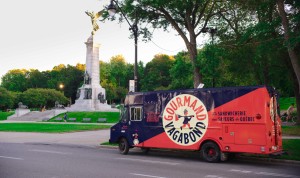Montrealers have a case of upset pockets
The big buzz of the summer seems to have sizzled out prematurely. When news of the 66-year ban on food trucks being lifted broke, people were utterly overjoyed. Now, months after the project has begun, the buzz is gone. Customers are criticizing prices, selection and intent of the project. Some might be looking too far into it and are forgetting that we are only talking about food. How can more food be bad?
Gourmand Vagabond food truck in downtown Montreal. Photo by Keith Race.
For foodies, the diversity of options is fantastic. You can get anything from butter chicken at Guru to lobster rolls at Lucille’s Seafood Company. Since the trucks rotate stops, you don’t have to travel to different locations to try them all.
The project also gives fine dining a fast-food element. When you just want to grab a delicious, unprocessed meal and go, the options are slim. With the food trucks, you’re able to eat fast but not in the traditional fast food way. Instead of going to the Au Pied du Cochon restaurant, people can visit the food truck on their breaks and eat foie gras poutine while walking to their next class.
Gourmand Vagabond food truck prices. Photo by Keith Race.
Those saying the prices are higher than expected seem to have missed the memo; the intent is to provide Montrealers with high-quality food, so a higher price tag should be expected. According to a report by The Gazette, the city requires the food trucks to have “creative and original [food], present an added value to city’s gastronomic landscape, stand out from the fast-food already on offer downtown, and use local products.”
Maybe critics are also unaware of how much a typical lunch meal costs these days. A tandoori chicken pita can put you back $9 at Phoenix 1 but a Big Mac trio is roughly the same price, if not more. If you want a $2 regular hot dog, La Belle Province restaurants are accessible on every third street corner.
Well-known restaurants and food businesses, such as St-Viateur Bagel, have a name for themselves and therefore already have a clientele. Which is perhaps why the Quebec government did not issue permits to any non-established restaurants. Some people see the established-business requirement as a slap in the face to citizens who want to make a living in the food business, but don’t have the means to open a restaurant. However, in reality, food trucks are not a viable way to make a living. The Gazette reported that even successful restaurant owners rarely have success with their food truck version. For example, owner of Grumman 78, Marc-André Leclerc, says he has not yet made a profit off his food truck, while his restaurant of the same name made more than $1 million last year.
The project is supposed to be something different and fun. It’s great to be able to order waffles and gourmet grilled cheese on a street corner. This is just the start so there’s bound to be a few kinks. Why is having more food choice making some people so mad? It’s simple – if people don’t like the idea of food trucks, then they shouldn’t order from them.
This article was featured in The Concordian



0 comments on “Montrealers have a case of upset pockets”Add yours →